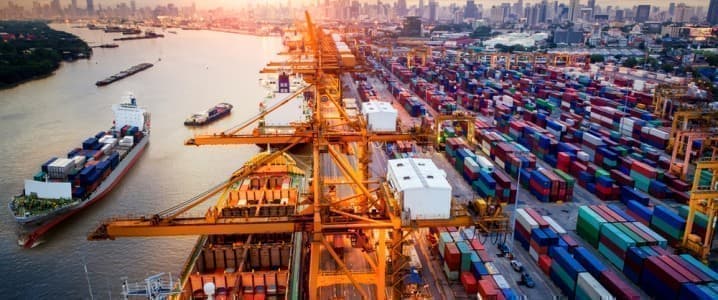As the much-delayed energy strategy is set to come out today, one thing is clear: the rhetoric has been centered around the need to phase out Russian oil and gas and increase British self-reliance. Reaching both of these aims won’t be possible in the short-run, as an energy revolution of such Herculean proportions takes decades. Nevertheless, renewable energy features heavily in these plans, alongside Boris Johnson’s favorite bet – nuclear.
Much has been made of where to build new nuclear plants, how long they would take, and how to win domestic consent for onshore wind farms (“eyesores”, in the words of Grant Shapps). Bubbling underneath this is a question of where our future dependency will lie and if our current relationship with Russia will simply be transferred to another murky regime.
To build all the solar panels that Johnson has promised, we’ll need a lot of silicon – which is readily available in China. One of the main components of wind farms is steel, yet another market in which China is the leading player. Then there are the rare earth elements (REE), minerals used to power electric vehicles, and wind turbines. Here too, China is way ahead of us.
“China and India are the main manufacturers of wind and solar. Most solar manufacturers get materials directly from China, so it is extremely likely that we would still rely on Beijing”, says Kofi Mbuk, cleantech analyst at Carbon Tracker. If a security crisis involving China was to happen, the entire market would be halted, he says.
The UK has been wary of China, pushing to keep Beijing out of most major infrastructural projects for security reasons. When the electric revolution started, Western countries were worried about the migration of wealth and jobs to China. “That concern has taken a new nuance entirely, with a much more fundamental shift: it is now about security”, says Paul Smith, Chairman of mining royalty and streaming company Trident Royalties. According to Smith, it is already possible to pick out the quick evolution of two distinct supply chains: China and Russia versus anyone else.
Related: Does China’s Friendship With Russia Really Have ‘No Limits’?
Africa is squeezed in the middle in this scenario, as the two “blocs” compete for their assets and supply. Cobalt, the key component of lithium-ion batteries used to store renewable energy, is found mainly in the Congo. China already controls over 40 percent of this production, and has been heavily investing in infrastructure and energy projects in the continent since the early 2000s – it has a big head start.
The same can be said for the seventeen rare materials available. They differ in price and availability but are all essential to kickstart the net-zero transition. Ramon Barua is the CEO of Aclara Resources Inc, a company currently sourcing some of these rare earth elements from Chile. “The value chain is severely controlled by China. The EU and the US have to figure out where they can find these elements”, he says.
As the UK turns to renewable energy, partial reliance on the Chinese market seems unavoidable, at least at first. The real question is whether the UK and other Western countries will be quick enough to compensate for China’s speed in securing some of these highly valuable markets.
In order to increase our self-reliance, we would need to recycle and reuse the minerals and batteries available, according to Heather Plumpton, an analyst at Green Alliance. Cutting overall energy demand, especially within the transport and housing sector, would naturally reduce our reliance – but it would come with a culture shock for industries. For some of the materials we need, the UK could look to alternative markets starting to embed themselves in the supply chain, such as Australia and Canada. In order to recycle and reuse minerals, we would need to have a significant number of these to hand, to begin with.
Other technologies such as hydrogen and carbon capture promise a future rich with energy we can generate ourselves in the UK. But it’s an expensive venture and has yet to truly come to fruition, so for many, it feels too far off.
Christian Lindner, Germany’s finance minister, recently described clean energy as the “energy of freedom”. We might ask freedom from whom.
ADVERTISEMENT
The benefits of the green transition are not something parties can reap, as these developments will take longer than an election cycle. But Boris Johnson will want this energy strategy, part of a broader push to net-zero, to be his legacy. Surely he doesn’t want the legacy of handing over the power to yet another secretive and authoritarian regime.
By City AM
More Top Reads From Oilprice.com:
- Rising Energy Costs Could Push Metal Prices Even Higher
- World’s Richest Have Taken A $400 Billion Wealth Cut Amid Ukraine Crisis
- The Energy Transition Will Transform Geopolitics



















Therefore, all this talk particularly by the EU about reducing its dependence on Russia’s oil and gas exports is hot air. The EU and the whole world will continue to depend on Russian oil and well into the future.
No one single oil or gas producer in the world or a group of producers can replace Russian crude oil and gas exports now or ever.
The European energy crisis that has been enveloping the EU long before the Ukraine conflict erupted has shown with overwhelming evidence the inadequacy of renewables to satisfy the EU’s electricity demand because of their intermittent nature.
Dr Mamdouh G Salameh
International Oil Economist
Visiting Professor of Energy Economics at ESCP Europe Business School, London
We will see what will happen now that Putin is taking a stand on the payment with rubles issue.
In this publication, readers tend to have their eye on the energy supply side. When geopolitics get bad enough, emphasis can shift to the energy demand side.